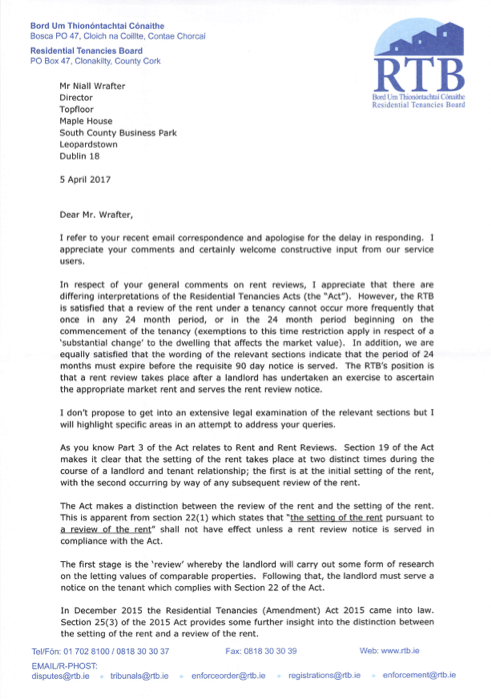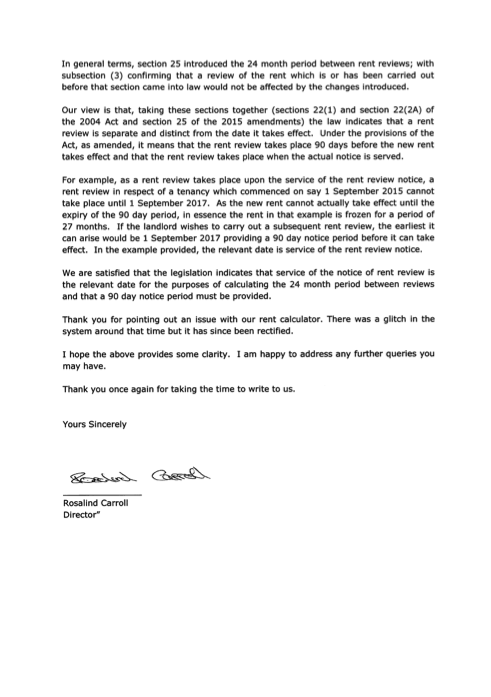Pre-Legislation
Prior to the Residential Tenancies Act 2004, residential tenancies were unregulated. The practice at the time was to give a 12 month lease.
The common understanding of a rent review was that it was a change of rent and it could occur only every 12 months and apply at the start of the new 12 month Fixed Term lease.
The Residential Tenancies Act 2004
The RTA 2004 established the (P)RTB, a state agency that would amongst other things, maintain a register of tenancies. Registration of a tenancy is now compulsory.
The RTA 2004 also established Adjudicators and Tribunals. The RTB could appoint Adjudicators and Tribunals for disputes but could not direct them. In other words they are independent of the RTB.
In Part 4 of the Act, the principal of a minimum in security of tenure ( Part 4 tenancy ) was created.
- A tenant could remain in the property for up to 4 years.
- The landlord could regain possession in the first six months without providing reason.
- Thereafter landlords could only regain possession under six grounds, including selling the property.
- Within this 4 year tenancy you could give greater security of tenure with one or more Fixed Term agreements. Under the Fixed Term, the landlord could not regain possession in the first six months or rely on the six grounds for termination. However there is an opionion that the Fixed Term Clause can be constructed to restrict the tenants rights but not the Landlords.
- Where a Fixed Term was granted the Part 4 ‘ran in the background’ guaranteeing a minimum in security of tenure.
- A review of rent could not occur more frequently than once in each period of 12 months.
- A 28 day notice in writing was required before the new rent was to come into effect.
Problems with the new law
The market continued to issue 12 month leases. In many instances Tenants and Landlords believed the Part 4 to be a 4 year lease, when in fact the Part 4 Tenancy was for up to 4 years. In addition, many users of the legislation believed the grounds for terminating a Part 4 tenancy also applied to the Fixed Term. There is now separate information on the RTB website about terminating a Part 4 Tenancy and Terminating a Fixed Term. However confusion still prevails.
Residential Tenancies (Amendment) Act 2015
- The PRTB became the RTB.
- Section 20 of the Principal Act is amended so that a rent review could not occur more frequently than once in any 24 months ( previously 12 months ).
- Section 22 was amended so that 90 days notice was now required before the date from which a new rent was to have effect ( previously 28 days )
- Various statements were now required such as market rent, comparable properties and tenant’s rights.
There was confusion as to whether this law changed how a rent review was to be applied. It simply changed the dates. However in 2016, the RTB and it’s adjudicators and tribunals split with the common understanding of a rent review.
Rent Reviews - The Split 
The common understanding was that a change of rent and rent review were the same. We are not certain when the RTB and it’s adjudicators and tribunals split with the market’s common understanding of a rent review, but the earliest evidence we can find of this is in a case the Tribunal heard on 18 May 2016. Tribunal Reference No: TR0216-001630 / Case Ref No : 1215-22946. The dispute concerned the market rent. However the Tribunal focused on the manner in which the notice was served.
In previous Determination Orders, the Adjudicators and Tribunals had found the operable date of a rent review is the date the new rent was to have effect. This was the common understanding of the Market and the understanding on which the appellant Irish Residential Properties REIT plc was depending. The Tribunal found “A review of rent is not defined in the Residential Tenancies Acts”.
So what was the rent review ? They decided the Rent Review was NOT the change in rent or the new rent. The Rent Review was something that happened before the notice was sent. This means that the 1st change in rent could only be applied at 24 months + 90 days. Written confirmation that the RTB’s opinion was in line with the above findings, was received by us on 5th April 2017 and is included at the end of this blog.
Planning and Development (Housing) and Residential Tenancies Act 2016
The 24th December 2016 saw the introduction of rent control measures in Dublin and Cork.
An area could be designated an RPZ and any rent review was subject to a formula.
Details of these changes are the subject of another of our blogs, but for the purposes of this document it is important to know :
- The length of tenancy was extended to 6 years for all new tenancies
- Tenancies in a RPZ could be subject to rent review every 12 months
- Tenancies outside an RPZ could be subject to rent review every 24 months, as before.
The Residential Tenancies (Amendment) Act 2019
Most of these provisions were enacted on the 4th June 2019.
The Bill’s key provisions are :
-
To provide the RTB with powers to carry out investigations of landlords and impose administrative sanctions;
-
To provide for offences in relation to non-compliance with rent increase restrictions in rent pressure zones; the creation of criminal offences for landlords connected with non-compliance with rent increase restrictions in RPZs and tenancy registration requirements and non-cooperation with investigations related to administrative sanctions;
-
to increase the notice periods to be provided in the case of termination of a tenancy by a landlord
-
to provide for annual registration by landlords of tenancies
-
to amend the registration process
-
to provide for mandatory publication of determination orders by the Residential Tenancies Board
-
to provide that the letting of a house or part thereof for any period not exceeding 14 days in a rent pressure zone is a material change in the use of the house or part and for that purpose to amend the Planning and Development Act 2000 ( Air B&B )
-
defining a ‘substantial change in the nature of the accommodation provided under the tenancy’ in respect of which an exemption applies from the rent increase restriction in RPZs;
-
Further Part 4 tenancy agreements are NOT treated as new tenancies but as extensions to the sitting tenants' previous tenancy in the dwelling in question
-
the RTA 2004 - 2019 now applies to any dwelling providing residential accommodation to students during academic term times under a tenancy.
From the adminstration of a tenancy point of view, the main implicaiton of this Act is that Further Part 4 Tenancies created at the end of each 6 year cycle are now no longer considered as New Tenancies. A Further Part 4 Tenancy is now treated as a continuation of the current existing tenancy and consequently a new rent cannot now be set at the start of the Further Part 4.
You have an option toward the end of the FIRST Part 4, to deny a further Part 4. If the Further Part 4 is not denied, the tenancy simply continues.
The RTB introduced Annual Registrations from the 4th April 2022.
This followed the introduction of a new registrations portal and database.
A tenancies must be registered annually on the anniversary of the TCD ( Tenancy Commencement Date ).
An annual registration fee would apply, with the exception of tenancies in a Further Part 4, these would still have to be registered annually but no fee would apply.
New data was required for registration including the Landlord DOB.
Residential Tenancies (No.2) Act 2021
There were significant changes introduced by the RESIDENTIAL TENANCIES (NO. 2) ACT 2021 on Friday 16th July 2021. These included :
- to extend the emergency period
- to provide for the giving of a minimum notice period by students
- to restrict payments required to be made by tenants
- to extend the period during which areas shall stand prescribed as rent pressure zones.
Specifically the amendment of section 19 of Act of 2004 changed completely how the rent was to be "Set" in a tenancy in an RPZ. Prior to this, rent was "Set" using a formula that limited the increase to 4% per annum ( once below Market Rent ). It was decided this set a target for landlords and following the ban on rent increases during the Covid Pandemic, many tenancies were facing an 8% increase. It was decided to replace the 4% formula before this could happen.
The rent could now only be "set" at the tenancy commencement or reviewed during a tenancy with reference to the HICP ( Harmonised Consumer Price Index ). This is published by the RTB, who must also provide a "Rent Calculator". This would, under normal circumstances, allow for far less of an increase in rent and remove a "target" rate. Rents in an RPZ could be increased as per the Rent Calculator but only if below the market rent and with three comparables to prove so.
This legislation reinforced the previous decision made by the Tribunal, which was described in the "Split" above. The "Date the rent was last set" and the "Date the new rent is set" firmly established the Tenancy Commencement Date ( TCD ) and the Notice of Rent Review Date as the Rent Review dates. The effective date the rent changed was not relevent for the purposes of the setting the rent at the start of the tenancy or reviewing the rent during the tenancy. In theory the Rent Review and the Notice of Rent of Review could happen on different days but the RTB began recommending that they occur on the same day to avoid confusion.
Residential Tenancies (Amentment) Act 2021
Most of these provisions were enacted on the 11th December 2021.
The key changes in the 2021 Amendment Act were as follows :
- Rent setting in Rent Pressure Zones from now, for tenancies in RPZs, setting the rent at the start of a tenancy and pursuant to a rent review is capped at 2% per annum pro rata, where HICP inflation is higher. This change came into effect on 11 December 2021 (section 3 of the 2021 Amendment Act).
- Tenancies of unlimited duration – all new tenancies created on or after 11 June 2022 will become tenancies of unlimited duration after 6 consecutive months in occupation under the tenancy
- Where a Part 4 tenancy or further Part 4 tenancy of a dwelling was created or came into being before the 11th June 2022, and expires on or after the 11th June 2022 a NEW tenancy shall be created of unlimited duration on expiry of the Part 4 or Further Part 4 .The 6 year cycle would no longer continue.
Summary
The easiest way to explain Residential Tenancy Law is as follows :
- The Tenancy and the Lease are two different things. A tenancy can exist without a lease. However, the tenant should receive a lease at the start of their tenancy. The lease should confirm :
- The Tenancy Commencement Date ( TCD )
- How the rent is set
- Terms and Conditions ( no pets, no smoking etc. )
- Tenancies are of an unlimited duration. The lease may confirm a Fixed Term but this does not limit the term of the tenancy, it increases the security of tenure for that fixed term. The tenancy may continue beyond that.
- The rent is changed during the tenancy on foot of a Notice of Rent Review, not a new lease. The tenant may dispute the change of rent on the basis of the manner in which the notice was served and on the comparables given.
- The rent on a Tenancy in an RPZ is set with reference to the HICP / 2 % rule as published by the RTB.
below... RTB’s opinion concerning " The Split "


